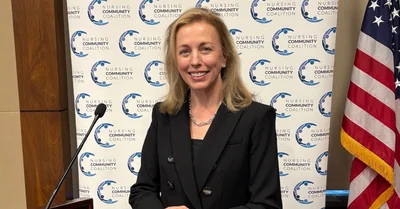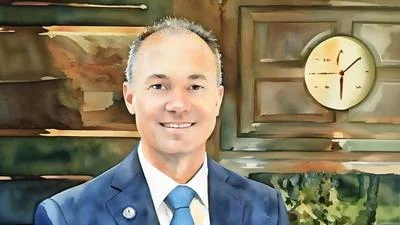According to some policy groups in Washington, D.C., a web of domestic regulations matched to ideological agendas are eroding national competitiveness. This includes trade policy, energy infrastructure, food safety, and even free speech.
Andrew Hale, a trade policy analyst at the Heritage Foundation, argues that America’s economic stagnation and regulatory dysfunction have created self-inflicted barriers to growth.
Drawing on his international experience in both the U.S. and U.K. governments, Hale warns that misguided protectionism, public health blind spots, and overzealous diversity mandates are steering policymaking away from merit and market efficiency. He sees solutions in trade liberalization, but also in a return to governance that prioritizes productivity, public accountability, and freedom of expression.
Hale is the J. Van Andel Senior Policy Analyst in Trade Policy at the Heritage Foundation's Thomas A. Roe Institute for Economic Policy Studies. Born to an American mother and British father, Hale has served in roles on both sides of the Atlantic, including at the U.K.’s Department for International Trade, the U.S. Congress, and the State Department. With experience in aerospace and international policy, he now focuses on U.S. trade policy, advocating for reforms that prioritize economic freedom and national competitiveness.
“Tariffs are not a panacea to all of our problems,” Hale says. Using the example of the declining number of blast furnaces in the U.S., he notes, “In 1990, we had 57 blast furnaces, and we’re now down to 11.” He cites overregulation and outdated infrastructure, noting that “net zero targets do not mix” with steel production. Hale points to Canada’s nuclear- and hydro-powered steel as examples of how energy sources and regulatory flexibility impact competitiveness. “Technically speaking, they could just turn out the lights,” he warns, referring to Canada’s role in supplying power to much of the northeastern U.S.
On agriculture, Hale highlights the cost of environmental rules: “Some of our sheep farmers are losing 40% of their herds to coyotes and foxes” because the EPA bans strategic placement of poison bait. In contrast, “in Australia, they’re allowed to strategically place poison bait around their farms… and in New Zealand, they’re blessed with no predators.” He calls this a failure of domestic regulation: “We created this problem right here in Washington, and we could fix it by just getting rid of that stupid regulation.”
Hale also criticizes U.S. sugar policy, describing how powerful interests have maintained “effectively sugar price controls.” He explains, “They own Tate & Lyle, they own Domino’s Sugar, Florida Crystals… they really are a monopoly.” He even links the protectionism to public health. “As an alternative to expensive U.S. sugar, we use high fructose corn syrup… We have some of the most obese children in the world.”
Hale also takes aim at hormone-injected meat and its implications for trade agreements: “You can take a syringe and just inject a freshly hatched chick, and within six weeks it’s a full-fledged hen producing eggs—that is not natural.” He cites correlations between hormone exposure and early puberty in American children and warns that such practices are stumbling blocks to deals with the U.K. and EU.
He draws a chilling parallel to his time at the U.K. Department for International Trade, where he saw political ideology override policy goals. He recalls asking his superior, “What’s the ultimate goal you have this year for this trade department?” The response? “To get the highest ranking from Stonewall as the most inclusive employer for transgender and non-binary people.” Hale says, “I want to be inclusive… but what does this have to do with trade policy?”
He praises President Trump for ordering the deletion of “all the DEI-ESG stuff.” The ideological capture, he argues, alienates the working class and undermines competence. “These are luxury beliefs… working-class people who have more daily struggles don’t have time for this.”
Hale underscores the view that identity should not be part of any qualification. “My gender, my sexuality, my color, my socio-economic background—these are not skill sets,” and so, “these should not be criteria for giving someone a job.”









